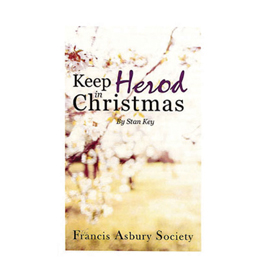
by Stan Key Scripture Reference: Matthew 2:1–18
Many billboards and bumper stickers remind us to “Keep Christ in Christmas.” Yes, of course! But I’ve never yet seen one urging us to “Keep Herod in Christmas.” It seems this wicked tyrant has often been left out of the popular renditions of the story. I’ve yet to see a Christmas card depicting the slaughter of the innocent children carried out by Herod’s soldiers. Such scenes disturb us and make it difficult to enjoy chestnuts roasting on an open fire while Bing Crosby sings “White Christmas.” What does Herod have to do with this wonderful holiday? Can’t we just omit that part of the story?
Pause and consider. When we expunge Herod from the narrative, removing the terror and mayhem caused by his sinister deed, when we omit the pain and suffering that were part of Christ’s coming into the world, we make it impossible to understand the real meaning of Christmas. We end up with a sanitized, sentimental story that makes us feel warm and fuzzy but insulates us from the hard realities of the world in which we live. We much prefer to close our eyes to the suffering around us, turn up the Christmas music, pour another cup of hot chocolate and snuggle up close with those we love, pretending that “all is calm, all is bright.”
I wonder how the mothers of Bethlehem felt about that first Christmas. Could those who witnessed the brutality of that awful night sing, “Joy to the world, the Lord is come”? The music of Christmas is not all joyful and inspirational. If we listen as we ought, we also hear a mournful lament that accompanies Christ’s birth and no true Christmas celebration is complete without it.
A voice is heard in Ramah,
Weeping and loud lamentation,
Rachel weeping for her children,
She refused to be comforted,
Because they are no more (Matthew 2:18).
All great stories have a villain, and the Christmas story is no different. We enjoy remembering personalities such as Ebenezer Scrooge, the Grinch, Cruella de Ville, and Mr. Potter during the Christmas season. But these characters are all fictional, and often they make us laugh. Not Herod! This guy is as real as the terrorists, warlords, and murderous thugs that inhabit our world today. Appointed procurator of Judea by Julius Caesar, Herod was about 70 years old when Jesus was born. Paranoid and insecure, he tolerated no rival. Herod killed his wife, his mother-in-law, his brother-in-law (who was also the High Priest), and three of his own sons. Little wonder that Emperor Augustus said that it was safer to be Herod’s pig than his son (as a Jew, Herod refused to eat pork).
So what can we learn about the meaning of Christmas from Herod? Why is it so important to keep him in the story?
1. Herod helps us to remember that Jesus came into a real world.
Most celebrations of Christmas promote a warm and fuzzy holiday of happy faces enjoying security and prosperity. When the nativity is portrayed, the straw is always fresh, the barn is warm and disinfected, the shepherds wear clean bath robes, the animals are well behaved, and the baby is a plastic baby doll! But Jesus did not come into that kind of a world. How it must grieve God’s Spirit that many today have made Jesus’ birthday an occasion to insulate themselves from the sin and wickedness that so characterizes our planet. Jesus is a real Savior who came into a real world where real people struggle with real evil.
The Gospel, when rightly understood, is not a promise of health, wealth, and happiness. It is rather an invitation to embrace the hard realities of human existence by trusting in the glorious realities of salvation. C. S. Lewis stated the truth powerfully:I didn’t go to religion to make me happy. I always knew a bottle of Port would do that. If you want a religion to make you feel really comfortable, I certainly don’t recommend Christianity (God in the Dock).Perhaps we would be wiser to think of Christmas in terms of the D-day invasion on the beaches of Normandy (June 1944). Christ comes to reconquer the kingdom his enemy has stolen! His arrival means that the battle is about to begin! Herod reminds us that the world into which Christ was born is an evil world filled with cruel monsters.
2. Herod helps us to remember that Jesus’ coming exposes sin.
Bethlehem was a peaceful and happy little village… until Jesus came. His birth caused a genocide! All hell broke loose when he came to town. The truth is that the coming of Jesus does not eliminate the presence of evil; it intensifies it! When light shines into a dark closet, the cockroaches are not happy! The light enables us to see what has been there all along: fungus, mildew, and creepy crawling things. If Jesus is to save the world, he must first expose the evil that has been lurking in the shadows. We know that Herod was such a monster because Jesus came and turned on the lights! His coming into our world means that before things get better they are going to get a whole lot worse.
3. Herod helps us to remember that Jesus’ coming causes division.
Although the angels told the shepherds that the baby born in Bethlehem would bring “peace on earth” (Luke 2:14), Herod reminds us that this peace doesn’t look that peaceful! Even as an infant, before he had preached a sermon, touched a leper, healed someone on the Sabbath, or confronted a Pharisee, Jesus was already a controversial figure. His coming caused people everywhere to choose sides. The magi and the shepherds chose to come and worship. Herod and his minions chose to come and murder. Simeon stated the matter succinctly to Mary: “This child is destined to cause the falling and rising of many in Israel, and a sign that will be spoken against, so that the thoughts of many hearts will be revealed” (Luke 2:34–35).
The world loves to divide people into two groups: the rich and the poor, whites and blacks, east and west, males and females, Democrats and Republicans, Protestants and Catholics, etc. Jesus’ coming divides our world in only one way: those who love and worship him and those who hate him and want him destroyed. Jesus himself made it clear that he had not come to bring peace, but a sword (Matthew 10:34). His very presence divides us. Keeping Herod in Christmas helps us to remember this sobering reality.
4. Herod helps us to remember that Jesus’ coming enables us to be overcomers!
Though there is much about the massacre of the children in Bethlehem that we may never understand, there is one thing that is crystal clear. God saved the baby and his parents from the murderous villain. He delivered them from Herod’s evil grip and enabled them to survive and thrive in a world filled with hate. The dragon does all in his power to destroy the baby, but the Lamb wins!
And they overcame him (the dragon) because of the blood of the Lamb and because of the word of their testimony, and they did not love their life even when faced with death (Revelation 12:11).
Please don’t think that God was unmindful of those dear mothers who watched as their children were butchered by Herod’s soldiers. Though the “mystery of iniquity” may leave us perplexed, we can be sure of this: God had the decency to take his own medicine! In asking those mothers to give up their sons, God was preparing the way for what he himself would do 33 years later when he watched from heaven as his only Son was unjustly and violently killed. God knows what it’s like to lose a son. We can put our full trust in a God like that!
Conclusion
So, let’s keep Herod in Christmas! Though his presence is troubling, he is an important part of the story. If Herod is not real, the risk is great that Jesus and the salvation he brings will not be real either.
I have said these things to you, that in me
you may have peace. In the world you
will have tribulation. But take heart;
I have overcome the world (John 16:33).
 This article is available to order as a published tract.
This article is available to order as a published tract.
